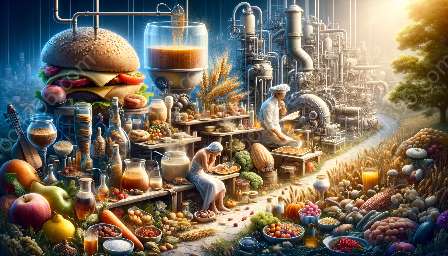The evolution of agricultural techniques and farming practices has greatly impacted food technology, innovation, and cultural history. The synergy between these interconnected realms has shaped the way we produce, process, and consume food. Let's delve deep into this topic cluster to gain a comprehensive understanding of how these elements have evolved over time.
Agricultural Techniques and Farming Practices: A Historical Perspective
Agriculture has been a fundamental aspect of human civilization since the dawn of time. The earliest farming practices date back to the Neolithic era, where humans transitioned from hunter-gatherer lifestyles to settled agricultural communities. This transition brought about innovative techniques such as the domestication of plants and animals, irrigation systems, and crop rotation.
The ancient civilizations of Mesopotamia, Egypt, and China played pivotal roles in the development and dissemination of advanced farming techniques. The introduction of plows, harnessing of draft animals, and the use of crop diversification significantly transformed agricultural productivity and sustainability.
The Influence of Food Technology and Innovation
The evolution of agricultural practices has been directly influenced by technological advancements and innovative solutions. From the invention of the first agricultural tools to the modern-day precision farming techniques, technology has continually revolutionized the way we cultivate the land and produce food. The advent of farming machinery, synthetic fertilizers, and pesticides has significantly increased agricultural efficiency and yields. Moreover, biotechnology and genetic engineering have enabled the development of high-yielding crop varieties that are resistant to pests and environmental stress.
Food technology has also played a crucial role in the preservation and processing of agricultural produce. From traditional methods of food preservation to modern food processing technologies, such as canning, freezing, and dehydration, innovations in food technology have extended the shelf life of perishable goods and facilitated food distribution on a global scale.
Impact on Food Culture and History
The evolution of agricultural techniques and farming practices has left an indelible mark on food culture and history. The availability of diverse crops and livestock has influenced regional cuisines and culinary traditions. Additionally, the introduction of new agricultural products through trade and exploration has enriched global food cultures.
Furthermore, the industrialization of agriculture during the 20th century led to significant shifts in food production and consumption patterns. The mass production of food, coupled with advancements in transportation and distribution, resulted in the widespread availability of a diverse range of food products around the world.
Conclusion
The evolution of agricultural techniques, farming practices, food technology, and food culture are deeply intertwined. This interconnectivity has shaped the way we produce, consume, and experience food. Understanding the historical context and the ongoing innovations in these realms is essential for addressing the challenges and opportunities facing the future of food production and sustainability.

